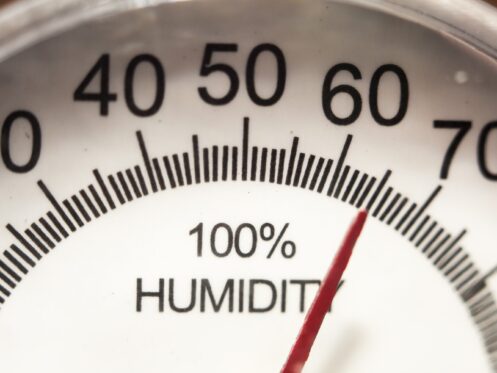High indoor humidity can make you feel sticky, hot and sweaty. This becomes exacerbated when humidity levels reach 80%, which happens frequently during the summer in Houston, TX. If you deal with this type of humidity indoors for too long, you’ll begin to experience excess oil and sweat production. It could even cause rashes, eczema and acne flare-ups.
Addressing humidity issues inside your home will make your family feel much more comfortable. Furthermore, it’s vital to remember the role that your air conditioner plays in defeating high humidity levels. After all, if your AC needs repairs, its efficiency levels may have dropped, along with its ability to remove the humidity from the air.
Reducing Humidity Is Energy Efficient
If your AC can’t keep up with the humidity, you could purchase a dehumidifier. This will assist your air conditioner by removing much of the humidity from the air. As a result, your AC will work more efficiently, and it may even reduce your energy bills.
Furthermore, taking steps to control humidity can prevent excess wear and tear on your AC. By taking immediate action to counter humidity levels indoors, you might even be able to extend your HVAC unit’s lifespan.
Enhances Your Indoor Comfort
Controlling indoor humidity can help in the following ways.
- Reduces summertime mugginess
- Prevents wintertime dryness
- Improves sleep by providing better indoor comfort
Summertime mugginess makes it much harder for your body to use sweat evaporation as a way to cool down. This is caused by increased stickiness in the air, which naturally makes you feel warmer. Instead of dealing with this all summer, you can reduce excess moisture with a dehumidifier. Without high humidity, your home will feel cooler, even if the outside temperature has soared from 85°F to 95°F.
Meanwhile, wintertime dryness causes scratchy throats, dry skin and lots of static electricity. Although a dehumidifier was the answer in the summertime, you’ll need a humidifier to deal with winter. By adding some moisture into the air, your family will feel much more comfortable.
Getting a good night’s rest makes you more productive. However, having humidity levels that are too low or too high could disrupt your sleeping process. For instance, if the humidity levels are too high, you could encounter health issues, such as respiratory problems and mold or mildew growth. It could also cause breathing difficulties and lead to an increased risk of heat stroke or heat exhaustion.
Protects Your Belongings
High humidity can be responsible for significant damage to your home and personal belongings. Additionally, it may cause your electronics to short-circuit and rust. The first sign of an issue is usually mold and/or mildew growth. Not only will they release spores that are harmful to your health, but they can also cause structural damage to your home. Common places where mold and mildew grow include the ceiling and walls.
High humidity levels may also be at fault if your wallpaper or paint becomes damaged. Your wallpaper may become physically detached from your walls. Meanwhile, paint can bubble and peel. This will leave you feeling uncomfortable, and you may need to repaint your home.
Certain appliances and metal fixtures can also suffer from high humidity. The resulting corrosion will do much more than simply rust, though. It will actually weaken the materials and could cause structural failure. Everything from your refrigerator to your home’s plumbing could be affected, which will then lead to expensive repair bills.
Any wood that was used to make your home can warp, swell and crack when you’ve got excessive moisture in the air. This also extends to furniture made from wood. Unfortunately, wood will absorb your home’s moisture better than most other items. Your structural beams may become warped, which is much more than simply an aesthetic issue.
Finally, pests tend to be attracted to a moist environment. In other words, bugs such as cockroaches and termites could flock to your Houston area home. While they prefer to live in dark, damp areas, their presence will still be felt. In fact, getting them eliminated often requires pest extermination. Instead, by reducing your home’s humidity levels, you might be able to avoid them altogether.
Pests can cause a lot of damage to your personal belongings, including:
- Structural damage
- Scratching and chewing
- Contaminating food
- Electrical damage
- Soiling and staining
- Damaging fabrics
- Damaging gardens and lawns
Improves Your Indoor Air Quality
Minimizing allergens in your home, along with reducing mildew and mold growth, provides a good reason to reduce your indoor humidity levels. First off, dust mites thrive in humid environments. Plus, they’re a common allergen. Bringing a dehumidifier into your home can cause this particular allergen to look for a more hospitable environment.
Another proven benefit of keeping your humidity levels between 40-60% is that it will help you reduce the growth of mildew and mold. Either of these can cause respiratory problems or trigger allergies. Again, using a dehumidifier should drastically reduce the amount of mold and mildew in your home, improving indoor air quality.
Best Ways to Reduce Humidity
The good news is that there are several proven methods for reducing humidity in the Greater Houston Area. Let’s take a look at a few of the best techniques.
Maintaining your HVAC system is your most important task. Therefore, be sure you replace your air filters on a regular basis, and be sure to run your HVAC unit if you have a water incident. Your HVAC system plays the most significant role in keeping humidity levels under control.
Putting dehumidifiers in place is a good way to reduce the moisture in your air. Use them in areas that typically have higher humidity, including your bathrooms, basement and kitchen. Be sure to keep your dehumidifiers clean and in good working order for the best results.
Water leaks must be repaired immediately, or else they could lead to worsening humidity problems. The moment you detect a leak, it’s critical to reach out to a professional for assistance.
How to Identify High Humidity
There are several ways to tell if your home is becoming too humid. The easiest method is to use a hygrometer. The simple readout screen typically tells you the indoor temperature and humidity level. If you see that it’s frequently above 60%, this means you need to reduce your indoor humidity.
Other signs include:
- Musty odors
- Window condensation
- Damp spots on ceilings/walls
- Worsened allergy symptoms
Dickinson’s Proven Indoor Comfort Specialists
We’ve served local homeowners since 1992 with an extensive list of air conditioning and heating services, including indoor air quality solutions. Whether your air conditioner needs repairs or you need a dehumidifier, we can help. We’re proud to have earned stellar ratings from out of over 900 Google reviews. Furthermore, we take steps to help our local community by working with nonprofits, such as Texas Children’s Hospital and Houston Parks Board.
Are you looking for a way to improve your indoor air quality in the Greater Houston Area? Reach out to Mackey Services today.





